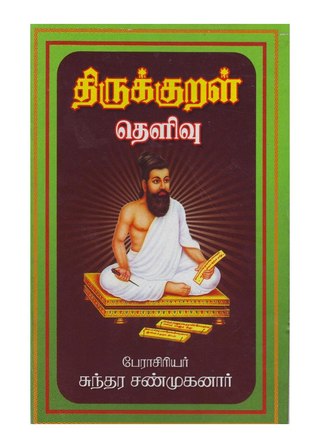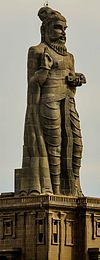
The Tirukkuṟaḷ, or shortly theKural, is a classic Tamil language text consisting of 1,330 short couplets, or kurals, of seven words each. The text is divided into three books with aphoristic teachings on virtue (aram), wealth (porul) and love (inbam), respectively. Considered one of the greatest works ever written on ethics and morality, it is widely acknowledged for its universality and secular nature. Its authorship is traditionally attributed to Valluvar, also known in full as Thiruvalluvar. The text has been dated variously from 300 BCE to 5th century CE. The traditional accounts describe it as the last work of the third Sangam, but linguistic analysis suggests a later date of 450 to 500 CE and that it was composed after the Sangam period.
Tirukkural, also known as the Kural, an ancient Indian treatise on the ethics and morality of the commoner, is one of the most widely translated non-religious works in the world. Authored by the ancient Tamil poet-philosopher Thiruvalluvar, it has been translated into at least 42 world languages, with about 57 different renderings in the English language alone.

Tirukkural remains one of the most widely translated non-religious works in the world. As of 2014, there were at least 57 versions available in the English language alone. English, thus, continues to remain the language with most number of translations available of the Kural text.

Latin is the first foreign language into which the Tirukkuṟaḷ was translated. There are three known translations of the Kural text available in Latin.
Kannada has at least eight translations of the Tirukkural available as of 2014. Both prose and verse translations have been made in Kannada.
As of 2015, there are at least four translations of the Tirukkural available in Russian.
As of 2015, there are at least two translations of the Tirukkural available in the Polish language.
As of 2020, there were at least four translations of the Tirukkural available in Arabic. The Kural text is the first, and so far the only, Tamil work to be translated directly into Arabic. It is also the first Tamil work to be released in the Arabian soil.

Among the European languages, German has the third highest number of translations of the Tirukkural, after English and French. As of 2015, there were at least eight translations of the Kural text available in German.
Malayalam has seen the most number of Tirukkural translations than that of any other language in India. As of 2007, there are at least 21 translations of the Kural text available in Malayalam. Malayalam also has the distinction of producing the first ever translation of the Kural text among the languages in India and the world at large. The Annual Report of the Cochin Archeological Department for the year 1933–34 reported an unpublished manuscript of a Malayalam translation of the Tirukkural made in 1595.
Telugu is one of the Indian languages that has had the earliest Tirukkural translations in modern times. As of 2000, there were at least 14 translations of the Kural text available in Telugu.
As of 2015, there were at least three Gujarati translations available of the Tirukkural.
As of 2015, there were at least five Sanskrit translations available of the Tirukkural.
By 2017, there were at least six translations of the Tirukkural in Odia, all published after the 1970s.
As of 2015, Tirukkural has been translated into Punjabi at least twice.
As of 2015, Tirukkural has been translated into Sinhalese at least twice.
As of 2015, Urdu has at least two translations available of the Tirukkural.
As of 2015, Tirukkural has been translated into Dutch only once.
As of 2015, Marathi has at least two translation available of the Tirukkural, of which one is complete.
E. S. Ariel, also referred to as Monsieur Ariel by his contemporaries, was a 19th-century French translator known for his French translation of the ancient Indian philosophical text of the Tirukkural. He translated select couplets of the Tirukkural into French in 1848 and published it in Paris under the title Kural de Thiruvalluvar . Although the first French translation of the Kural text was made by an unknown author in 1767, which Ariel had mentioned in his work, it was Ariel's translation that brought the ancient work to the French world.





